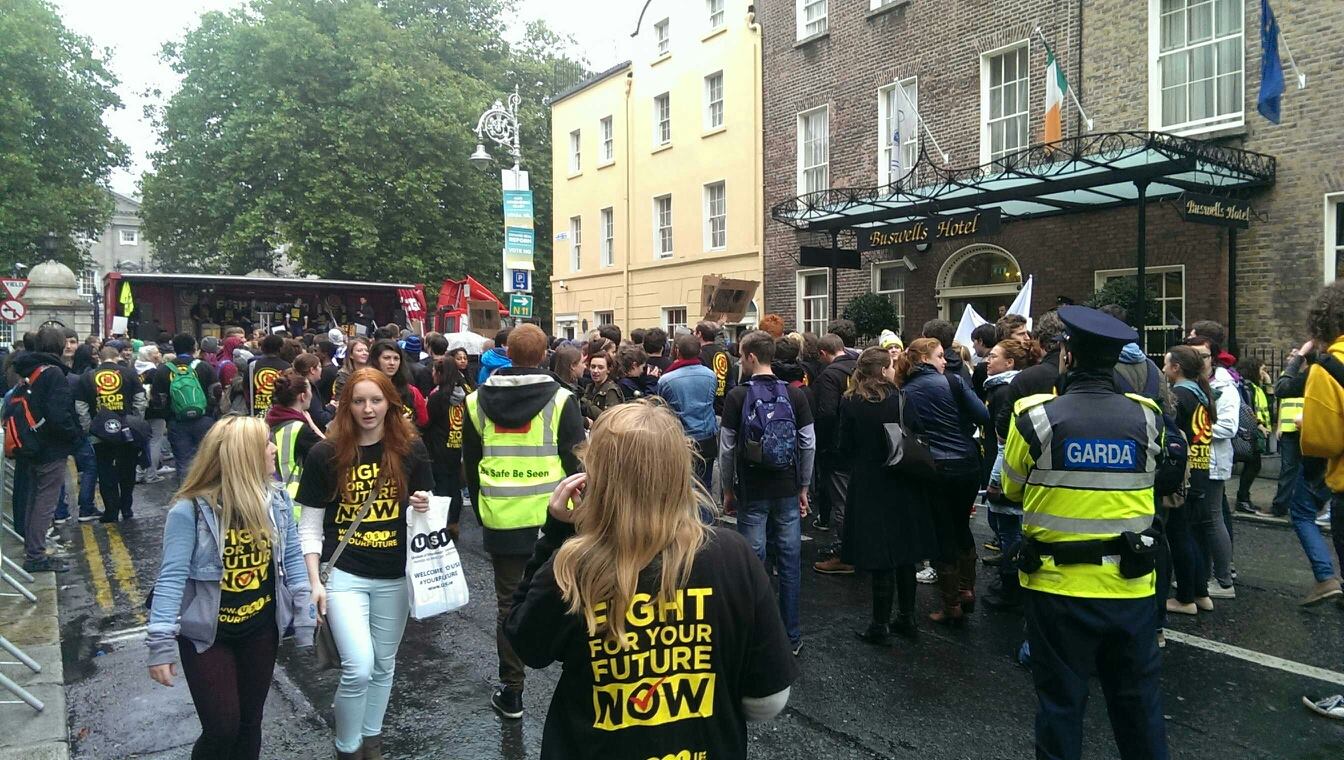Catherine Healy
News Editor
Approximately 50 Trinity students joined student union members from the surrounding region today at the Dublin rally for the National Day of Action, organised by the Union of Students in Ireland (USI). The turnout was disappointing in comparison to previous years, with only several hundred students present at the Kildare Street demonstration.
The modest crowd lined a section of Molesworth Street from 4pm, before dispersing about an hour later. Among the gathered protesters were representatives from DIT, IT Tallaght, IT Blanchardstown, IT Dundalk, Maynooth and the National College of Ireland (NCI).
A sabbatical officer from this college told Trinity News this evening that there had been miscommunication between themselves and USI during the planning stages of today’s rally, and anticipates potential conflict over the placing of blame in its wake.
In a statement to this paper on 10 September, Tom Lenihan, President of Trinity College Students’ Union (TCDSU), had said he hoped to see over 5,000 students at the rally. USI Vice President for Campaigns, Paddy Guiney, predicted a less optimistic figure of 2,000 students in a post on the demonstration’s Facebook event page this morning. Contrary to anticipatory remarks made by Guiney, which were published in today’s edition of The University Times, there was no republican presence at the demonstration.
The rally instead focused on speeches made by USI officers, which cautioned politicians of the repercussions of further education cuts in the upcoming Budget, set to be announced on 15 October.
Amid anti-austerity chants, Joe O’Connor, USI President, declared that “over 50,000 student voters will be mobilised by the end of the year.” “Targeted cuts will be met with targeted voting,” he warned. O’Connor spoke passionately about his own upbringing in a reference to accusations of political careerism often made by student critics of USI. “For four years,” he said, “I got through college on a full maintenance grant, and had to watch my family struggle to support me.”
In advance of a stunt which involved students “getting down on their hunkers” to represent the effect of government cost-cutting policies, Lenihan joined O’Connor in denouncing the targeting of vulnerable students. He told the gathered crowd that, “Every single one of you represents a student that has had to drop out.”
Glen Fitzpatrick, President of DIT Students’ Union (DITSU), said his thoughts were with “those students who cannot be with us today”. He pointed to “college authorities which didn’t have the decency to let students off class”, and referred to “those students who have to work longer hours in their crap, part-time jobs.” “
Speaking to Trinity News after the event, O’Connor claimed that “rain put people off”. He went on to deny that USI had been asked not to level criticism against any one political party and said he hoped the rally had “sent a clear and unified message to the government”. With the student contribution charge set last year to increase to €3,000 by 2015, USI focus, he added, was on opposition to further cuts to maintenance grants, which Minister for Education, Ruairi Quinn, refused to rule out when he spoke over the summer period at University College Cork (UCC).
O’Connor envisages that this year’s campaign will be accompanied by the establishment of a national database, called SERD (Student Elector Registration Database), through which the USI intends to match student voters to their constituencies. “There’s a preconception that students shout very loud but don’t back it up at the ballot box and we want to change that,” he said.
Today’s National Day of Action also involved demonstrations in Cork and Sligo. The rallies represented a departure from the strategy employed in the run-up to the last Budget announcement, when USI devolved campaigning responsibility to member unions as part of their attempt to target specific government TDs based on their political ties with Ruairi Quinn, or perceived electoral vulnerability.
Additional reporting by Tommy Gavin






